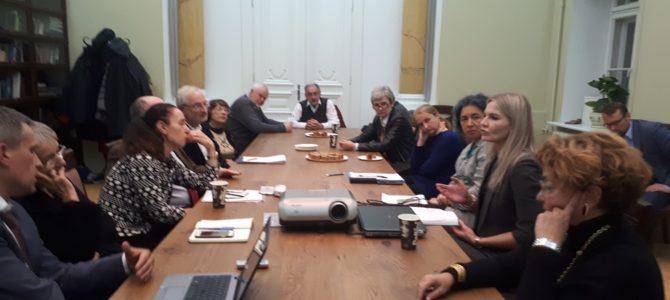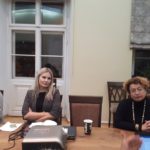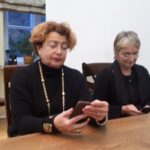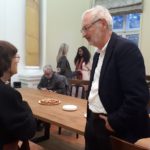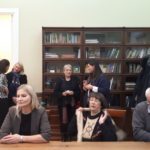The Lithuanian Jewish Community held a discussion October 24 about Jewish heritage protection from the present till 2020, about the priority tasks and goals in the context of 2020 being named the Year of the Vilna Gaon and the Year of Litvak History. The discussion mainly focused on the former Great Synagogue in Vilnius and how to protect what remains of it.
LJC chairwoman Faina Kukliansky, members of the Community, US embassy adviser on political and economic matters Shai Moore and foreign members of the LJC’s own heritage group, including Lyudmila Sholokhova (YIVO), Assumpcio Hosta (AEPJ) and Sergey Kravtsov (Hebrew University), took part in the discussion.
Chairwoman Kukliansky reminded participants Jewish heritage is important to the Lithuanian state and everyone concerned with heritage conservation, as well as to Jews. Discussions have been going on for years about how to protect the Great Synagogue site, the LJC’s role in that process and what to do with the school there, under which archaeologists last summer unearthed a portion of the synagogue’s central bimah. The situation is complex concerning the site: the school was scheduled for demolition but this year it was leased for two years to several organizations. There is clearly a commercial interest in this special location, Kukliansky noted.
It’s difficult to find experts in Vilnius who could be asked how best to commemorate the Great Synagogue, so the arrival of the international group of heritage specialists, their participation in LJC meetings, their perspectives and discussion of these perspectives is an important event.
Neringa Latvytė-Gustaitienė, the head of the history department at the Vilna Gaon State Jewish Museum, said the Great Synagogue of Vilnius is not just a symbol belonging to Lithuania, but to all Jews of Eastern Europe. It is a priority heritage site but sadly there hasn’t been any break through in the cultural community on this issue, she added.
LJC member, designer and architect Viktorija Sideraitė-Alon said the three days’ worth of meetings by experts in Vilnius again came to the conclusion the Great Synagogue is a highly significant monument of world civilization and is directly connected with the personality of the Vilna Gaon.
Another issue which came up numerous times in the discussion was the current generation’s relationship with the past and the responsibility involved in thinking about heritage for the next generation.
Professor Rita Šerpytytė, head of the Continental Philosophy and Religious Studies Cathedral at Vilnius University, pointed out Jewish heritage is important to intellectuals around the world who are not unconcerned about how it is treated in Europe. The Holocaust destroyed the Jews and their historical heritage which remains will never be the same as it was before the Holocaust. She said the LJC must decide what historical and religious memories need to be preserved.
Historian Ilja Lempertas believed the questions raised concerning the Great Synagogue demonstrate all that remains of it should be preserved, leaving the question of whether to preserve or rebuild to the next generation. He said it was a real miracle the kindergarten built on top of the site didn’t destroy what was left of the synagogue’s foundation.
Long-time Vilna Gaon Museum historian Irina Guzenberg, author of numerous books on Jewish history and Jewish Vilna, said she believed preservation was the best option, but if rebuilding was on the agenda, she felt the Gaon’s house should be rebuilt instead.
The idea of rebuilding the synagogue has been circulating for over 15 years now. Most feel it would be pointless because the famous pre-Holocaust synagogue would no longer have a congregation. The panel of heritage experts agreed, recommending preservation of what remains.
Chairwoman Kukliansky noted the parliament adopted a resolution on restoration of characteristic fragments of the Jewish neighborhood in Vilnius in 2002, and said it was time to amend it.
The discussion also touched on plans to expand and refurbish the Ponar Memorial Complex, the need for a visitor center there, protection of the Jewish cemetery in the Užupis neighborhood and other issues. The recommendations by the experts will aid in preparing better for 2020, the Year of the Vilna Gaon and the Year of Litvak History.


